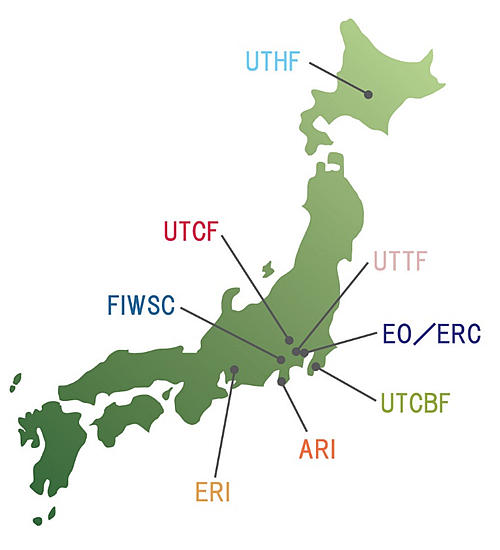 |
| Laboratory of Forest Management | Laboratory of Silviculture | Laboratory of Forest Policy | Laboratory of Forest Biogeosciences | Laboratory of Forest Utilization| Laboratory of Forest Botany | Laboratory of Forest Zoology | Laboratory of Forest Landscape Planning and Design | University Forests | Asian Natural Environmental Science Center | |||
|
|
|||
The University of Tokyo Forests (UTF) of the University of Tokyo was established in 1894 to contribute to forest science and forestry education and research in Japan.
|
|||
| UTCBF: Univ. Tokyo Chiba Forest, UTHF: Univ. Tokyo. Hokkaido Forest, UTCF: Univ. Tokyo Chichibu Forest, UTTF: Univ. Tokyo Tanashi Forest, ERI: Ecohydrology Research Institute, FIWSC: Fuji Iyashinomori Woodland Study Center, ARI: Arboricultural Research Institute, EO: Exective Office, ERC: Education and Research Center
|
|||
| Laboratory of Forest Ecology and Functional Biology https://www.uf.a.u-tokyo.ac.jp/english/research/laboratory_of_forest_ecology_and_functional_biology.html |
|||
| The Laboratory of Forest Ecology and Functional Biology conducts comprehensive and interdisciplinary research on the ecology and functions of forest organisms from both basic and applied perspectives. We employ a variety of approaches, ranging from micro to macro scales, and from laboratory work to field studies. Our aim is to establish management systems for healthy forest ecosystems by elucidating the ecology and functions of forest organisms. Additionally, we seek to contribute to human society, both directly and indirectly, through our research on the responses of organisms and ecosystems to environmental changes, the conservation of biodiversity, the management of pests and diseases, and the exploration and development of technologies for utilizing valuable biological resources. | |||
| Laboratory of Forest Watershed Socio-Environmental Studies https://www.uf.a.u-tokyo.ac.jp/english/research/laboratory_of_forest_watershed_socio-environmental_studies.html |
|||
| The Laboratory of Forest Watershed Socio-Environmental Studies conducts comprehensive and transdisciplinary research on the interactions between natural environments--such as forests and watersheds--and human societies. Our research focuses on the sustainable management of forest and water resources, examining the impacts of watershed environments on local communities and proposing solutions that integrate socio-economic perspectives. Through fieldwork, modeling, and technological innovation, we aim to provide scientific and socio-humanistic insights to foster harmonious coexistence between nature and humanity, with applications in ecosystem management, policymaking, and community initiatives. |
|||
| @Department of Forest Science, The University of Tokyo |
